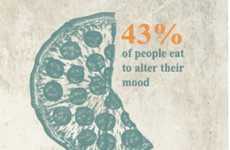
The Speed of Language Infographic Translates the Rate of the Spoken Word
Rebecca Byers — March 1, 2012 — Pop Culture
The Speed of Language infographic is a comprehensive overview of pace of dialogue in a variety of different tongues. The infographic reviews the data compiled by three researchers at the Universite de Lyon who decided to complete a study on the speed of language.
The researchers tested 59 volunteers (30 men, 29 women) for the study, each of whom spoke one of seven languages: English, French, German, Italian, Japanese, Mandarin and Spanish. They made 585 recordings of the same phrase, and compared the speed of each language.
The intriguing set of statistics gathered were compared by speed and density, which, as detailed in the Speed of Language infographic, led to the interesting conclusion that "less dense languages sound faster, while more dense languages sound slower."
The researchers tested 59 volunteers (30 men, 29 women) for the study, each of whom spoke one of seven languages: English, French, German, Italian, Japanese, Mandarin and Spanish. They made 585 recordings of the same phrase, and compared the speed of each language.
The intriguing set of statistics gathered were compared by speed and density, which, as detailed in the Speed of Language infographic, led to the interesting conclusion that "less dense languages sound faster, while more dense languages sound slower."
Trend Themes
1. Speed of Language - Opportunity to develop technology that can accurately measure and compare the speed of different languages.
2. Language Studies - Potential for advancements in the field of linguistic research and understanding through studies on speed and density of languages.
3. Cross-cultural Communication - Opportunity to improve communication among people who speak different languages by understanding the pace of their speech.
Industry Implications
1. Technology - Development of innovative tools and software that can analyze and compare the speed and density of different languages.
2. Academia - Advancements in linguistic studies on language speed and density can lead to a better understanding of communication patterns.
3. Translation and Interpretation - Improved understanding of the speed and density of languages can lead to more accurate translations and interpretations.
1.9
Score
Popularity
Activity
Freshness























